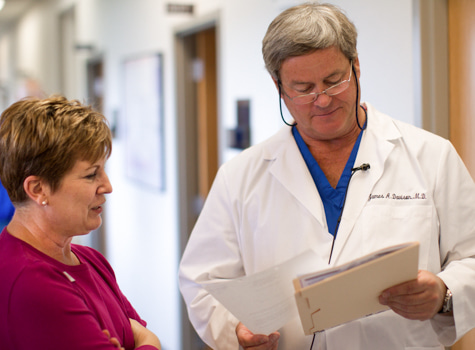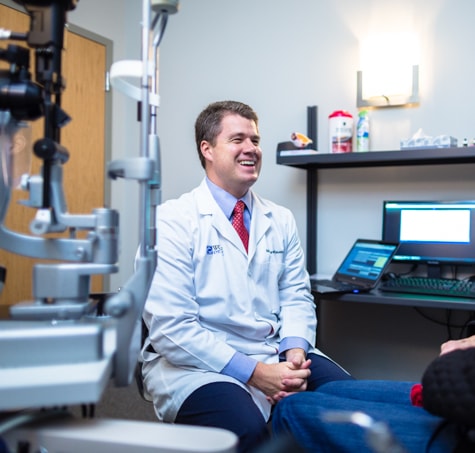LASIK Frequently Asked Questions
If you have questions about LASIK laser eye surgery, Wolfe Eye Clinic has answers for you. From beginning to end, you have a team of experts providing the best care in the state for you. We have been instrumental in LASIK development starting with FDA photorefractive keratectomy (PRK) trials on the excimer laser back in 1994 followed by our surgeons performing the very first LASIK surgery in Iowa in 1996.
 Since then we’ve continually introduced many of the newest and most improved laser technologies as soon as they’ve become available. In 2006, we were the first in Iowa to provide patients who had no astigmatism and did not qualify for LASIK, the implantable contact lens (ICL). In 2019, we further expanded vision correction options to those who do not qualify for LASIK by being the first in Iowa to offer an ICL implant option to those who have astigmatism, known as a toric ICL implant. No matter where you are in your LASIK journey, your personal LASIK coordinator and team will be here to guide you. Feel free to request more information here or give us a call at (833) 532-8809. Our LASIK coordinators would be happy to help.
Since then we’ve continually introduced many of the newest and most improved laser technologies as soon as they’ve become available. In 2006, we were the first in Iowa to provide patients who had no astigmatism and did not qualify for LASIK, the implantable contact lens (ICL). In 2019, we further expanded vision correction options to those who do not qualify for LASIK by being the first in Iowa to offer an ICL implant option to those who have astigmatism, known as a toric ICL implant. No matter where you are in your LASIK journey, your personal LASIK coordinator and team will be here to guide you. Feel free to request more information here or give us a call at (833) 532-8809. Our LASIK coordinators would be happy to help.
Can LASIK get rid of my reading glasses?
Whether or not you needed eyeglasses or contacts when you were younger, know that when you reach age 45 or so, most people gradually begin losing their ability to read clearly or focus on near objects. This is called presbyopia and is just part of the natural aging process. As we grow older, our natural lens becomes hardened and loses its flexibility to change shape which causes patients to struggle with close up vision. Unfortunately, if you’re middle aged and want to see clearly in the distance LASIK will not prevent presbyopia and the need for readers.
At what age can you get LASIK?
To have LASIK, patients need to be age eighteen or older with stable vision. Stable vision is important to help ensure that your vision does not change post-LASIK surgery and reduces your need for enhancements (i.e., touch-ups). Stable vision is considered little to no change in prescription for a least one year prior to a LASIK consultation. Many people also wonder, “Am I too old to get LASIK?” Good news is that there is no age limit! Your surgeon will weigh all of the pros and cons with you regarding your age at your LASIK consultation.
Can I have LASIK if I am nursing?
With all the increased demands of new motherhood, many would like to have LASIK done to reduce the day-to-day hassle of wearing eyeglasses or contacts. But nursing mothers need to wait a few months after nursing cessation before starting the LASIK evaluation process. That’s because the hormones associated with pregnancy and nursing can cause temporary eye changes which can cause fluctuations in vision. In order to get the best vision outcome, it is important that pregnant or nursing mothers wait at least three months after delivery or stopping nursing before coming in for a consultation. While not all mothers know when they will be done nursing, if you have an idea, you are welcome to call (833) 532-8809 and your personal Wolfe Eye Clinic LASIK coordinator will help you plan your appointment accordingly!
How do I know if I am a candidate for LASIK?
There are many factors considered when determining candidacy for LASIK laser eye surgery. As you consider whether you might be a good candidate for LASIK, it’s important that advanced testing be performed and personally reviewed by your surgeon. Wolfe Eye Clinic understands that everyone has different vision needs and goals which is why it’s crucial that your surgeon discuss those with you prior to surgery being scheduled. Very thin or abnormal corneas, extreme refractive errors, substantial dry eye disease or other problems may create barriers to you being a good LASIK candidate. But in some cases, new technologies and more advanced refractive surgery options from our Wolfe Eye Clinic specialists may provide you with other possibilities. All options and alternatives to LASIK surgery will be discussed during your free LASIK consultation.
What do they do in a LASIK consultation?
 During your free LASIK evaluation, our specialty teams at Wolfe Eye Clinic perform a series of advanced tests and gather your custom measurements. Specifically, the first tests are corneal evaluations which include topographical mapping, tomography and wave front analysis. We then measure your refractive error with a manifest refraction, then dilate your pupils for cataract assessment, glaucoma screening and retinal examination. In order to ensure accurate testing, we require that contacts not be worn one to three weeks prior to your LASIK evaluation depending on the type of contacts you wear. Pupil dilation can last between a few hours to up to twenty-four hours. For your safety, patients must arrange for a driver to drive them home from their LASIK evaluation. After all testing has been completed, you meet with your surgeon to review and discuss the results from your LASIK evaluation as well as ask any questions you have. From there, you may schedule your LASIK procedure!
During your free LASIK evaluation, our specialty teams at Wolfe Eye Clinic perform a series of advanced tests and gather your custom measurements. Specifically, the first tests are corneal evaluations which include topographical mapping, tomography and wave front analysis. We then measure your refractive error with a manifest refraction, then dilate your pupils for cataract assessment, glaucoma screening and retinal examination. In order to ensure accurate testing, we require that contacts not be worn one to three weeks prior to your LASIK evaluation depending on the type of contacts you wear. Pupil dilation can last between a few hours to up to twenty-four hours. For your safety, patients must arrange for a driver to drive them home from their LASIK evaluation. After all testing has been completed, you meet with your surgeon to review and discuss the results from your LASIK evaluation as well as ask any questions you have. From there, you may schedule your LASIK procedure!
Can I wear my contacts before a LASIK consultation?
Contacts change the shape of the cornea, the part of the eye that LASIK corrects. For accurate measurements and testing results, contacts must not be worn for one to three weeks prior to your free LASIK evaluation depending on the type of contacts you wear. Accurate testing provides better measurements which improves vision results and reduces the chance of needing an enhancement (i.e., touch-up LASIK re-treatment) after surgery. When you schedule your LASIK consultation, your coordinator will help you determine when and for how long contacts will not be able to be worn.
How safe is LASIK eye surgery?
 Like any surgery, there are risks associated with LASIK surgery. Most patients find LASIK to be much easier than expected, have little to no pain and are able to see the vision benefits of LASIK surgery later on the day of their surgery. It is important to note that the chance of having a serious vision-threatening complication is less than one percent. The use of a laser to create the corneal flap significantly reduces the risks previously associated with making corneal flaps using a mechanical microkeratome blade. As such, Wolfe Eye Clinic uses bladeless, all-laser LASIK technology and has done so since 2002.
Like any surgery, there are risks associated with LASIK surgery. Most patients find LASIK to be much easier than expected, have little to no pain and are able to see the vision benefits of LASIK surgery later on the day of their surgery. It is important to note that the chance of having a serious vision-threatening complication is less than one percent. The use of a laser to create the corneal flap significantly reduces the risks previously associated with making corneal flaps using a mechanical microkeratome blade. As such, Wolfe Eye Clinic uses bladeless, all-laser LASIK technology and has done so since 2002.
It is important to inform each patient of potential risks of the LASIK procedure and these risks will be discussed during the LASIK evaluation process. Potential risks include a slipped flap, infection, scarring and haze, dry eye, regression and incomplete correction. There is also the possible need for eyeglasses or contact lenses after surgery and visual symptoms including halos, glare, starbursts and double vision.
Do you perform LASIK surgery the same day as the consultation?
During your LASIK consultation, your pupils will be dilated. Dilation can last from a few hours up to twenty-four hours, occasionally longer. The laser tracking mechanism which keeps the laser focused on the exactly correct part of your eye works best when your pupil size is normal. For this reason, we do not perform LASIK surgery the same day as your LASIK consultation or generally, the next few days after. Typically, patients schedule the procedure anywhere from one week to six weeks after the LASIK evaluation depending on you and your surgeon’s schedules. If you are planning to have your procedure towards the end of the year or beginning of the following year in order to efficiently use Health Savings Account (HSA) or Flexible Savings Account (FSA) funds for LASIK, we recommend calling (833) 532-8809 mid-fall to start the process and plan with your personal LASIK coordinator accordingly! You don’t want to find out that you’re not a good candidate for LASIK after you’ve committed funding for the procedure.
Where will my LASIK surgery be performed?
Wolfe Eye Clinic offers free LASIK consultations in Iowa and follow-up care across the state at most of our main locations including Ames, Ankeny, Cedar Falls, Cedar Rapids (Hiawatha), Des Moines, Fort Dodge, Iowa City, Marshalltown, Ottumwa. Pleasant Hill and Waterloo. LASIK surgeries are performed at either our West Des Moines LASIK center or our Cedar Rapids LASIK suite in our climate-controlled operating rooms.
Are you awake during LASIK?
Patients are awake during LASIK but before surgery we give you some oral relaxing medicine and place numbing drops in your eyes to insure total numbness and comfort. LASIK is not considered painful. Patients have described the procedure feeling as if a small amount of pressure is being applied to their eye. You don’t need to worry about keeping your eye open or following a target. We use a soft spring on your eyelids to help keep your eye open and our advanced eye tracking technology simultaneously adjusts for all potential eye movement large and small. It is normal to be nervous even thinking about surgery but don’t worry, your surgeon and our staff are all very experienced, will make you comfortable and help you through every step of the procedure. We’ll talk you through it and even hold your hand to reassure you throughout the procedure which usually only takes 15 minutes.
Hear the facts about what you can expect after LASIK surgery from our experts at Wolfe Eye Clinic.
What happens after LASIK surgery?
 Patients should go home and rest for several hours following LASIK. The next day, you will come in for a follow-up appointment to check your vision and make sure the flap is in great position and everything is set to heal properly. From there, most patients go back to work. A year’s worth of follow-up care is included in your investment. Postoperative care can be provided by Wolfe Eye Clinic or your referring optometrist of choice. If you don’t have an optometrist, we can help you find one near your home to help provide co-managed care after surgery.
Patients should go home and rest for several hours following LASIK. The next day, you will come in for a follow-up appointment to check your vision and make sure the flap is in great position and everything is set to heal properly. From there, most patients go back to work. A year’s worth of follow-up care is included in your investment. Postoperative care can be provided by Wolfe Eye Clinic or your referring optometrist of choice. If you don’t have an optometrist, we can help you find one near your home to help provide co-managed care after surgery.
Does LASIK wear off?
During LASIK, your cornea is being permanently reshaped. The benefits of the procedure are typically lifelong. At Wolfe Eye Clinic, fewer than five percent of patients need any further LASIK vision correction. There is a common misconception that LASIK may “wear off” after a certain number of years but with rare exception it does not. What happens, whether or not you have had LASIK, is that as we age, our eye’s natural lens becomes firm. A firmer lens typically requires patients to need reading eyeglasses to see up-close. The lens may also become yellowish and develop a cataract, requiring eyeglasses to see clearly. Typically, once the cataract is removed through surgery, vision is restored. The average age for cataract surgery is 70.
Contact the LASIK Leaders at Wolfe Eye Clinic
To find out if you are a candidate for LASIK, please call one of our LASIK Coordinators at (833) 532-8809 or request an appointment online here to schedule a free LASIK consultation near you. You may also request our LASIK informational packet here. Wolfe Eye Clinic has experienced LASIK surgeons across the state. We offer free LASIK consultations at our Ames, Ankeny, Cedar Falls, Cedar Rapids (Hiawatha), Des Moines, Fort Dodge, Iowa City, Marshalltown, Ottumwa, Pleasant Hill and Waterloo clinics.